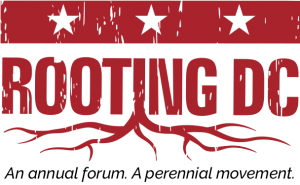Interested in growing fruit trees in DC? This class will cover all the fruit trees that can be grown in DC and how to maintain them organically. This class will cover pests, diseases, management practices, harvesting techniques, and a short intro to pruning.
Teacher Bio:
Josh Singer is the DPR Community Garden Specialist. He works to build new gardens, establish garden support systems, advocate for food security, and create garden education throughout the District. Josh is also the Co-Founder and Executive Director to Wangari Gardens, a 3 acre garden park. Josh is a certified arborist, master gardener, master composter, Bumba Apiarist, licensed teacher, and has a cerftificate in Permacutlure Design and EcoCity Farms Urban Gardening .
Learn to deal with aquatic, subterranean, terrestrial, and flying invertebrates for composting, pest management, and food for fish, animals, and humans! The course goes through presentations and demonstrations, and is set up to go through a natural cycle starting with our two ancient aquatic invertebrates brine shrimp, and triops, moving on to our subterranean red wiggler worms, followed by crickets, mealworms, waxworms, superworms, BSF larvae, hornworms, their beetles, moths, and flies! Participants will get hands on time setting up small habitats to take home with their choice of crickets, mealworms or red wiggler worms. The course will end with a demonstration on cooking with edible insects, anyone who desires may participate in an Entomophagy (The eating of Insects) Space is limited to 15**
Date: July 31, 4-9 pm Cost: $40
Location: Charm City Farms Brick Barn Instructors: William Padilla-Brown
**Notice of cancellation must be given 48-hrs in advance of any of our workshops or events in order to request a refund. Cancellations are subject to a $5 restocking fee.**
About the Instructor
William Padilla-Brown is a social entrepreneur, certified permaculture designer, and multidisciplinary citizen scientist. He has run a non-profit in New Cumberland, Pennsylvania for the past 3 years called Community Compassion, focusing on radical sustainability. He has educated children and adults on topics varying from mushroom cultivation to nutrition via. various workshops and programs. William dropped out of high school at age 16 and has since been pursuing a non-traditional independent approach to his higher education actively promoting alternative education options. William also runs a biology lab/observatory, and mushroom microfarm, MycoSymbiotics, LLC
Growing organically is trying to grow in harmony with nature, without using synthetic fertilizers, pesticides, herbicides or other synthetic products. We will learn that an important ‘rule’ in organic gardening is feed the soil, not the plant. To feed the soil, we organic gardeners must return the resources our gardens consume by adding organic matter such as compost and or cover crops. We also allow for a certain level of pest damage to our plants and we will learn which bugs are beneficial, which are destructive, when they are likely to arrive and what we can do about them.
Registration required: http://offices.ext.vt.edu/arlington/programs/anr/offerings/registration/VCE_Arlington_ANR_Program_Registration.html
Learn how to create a critter proof cage for your garden to prevent critters, vandalism and theft from getting to your garden. We’ll learn by actually creating several critter proof cages. You’ll also receive an intro to powertools and carpentry as well. No skills reqiured.
Teacher
Josh Singer, as the DC Parks and Recreation (DPR) Community Garden Specialist, builds community gardens, urban farms and develops urban Ag. support systems such as an urban garden education series with over 100 urban Ag. classes a year, a garden toolshare, a 4 greenhouse seedling cooperative, and a community compost cooperative network serving over a 1000 active composters. Josh also is the co-founder and executive director of the 501c3 non-profit 3-acre garden park called Wangari Gardens, the founder of the DC Food Recovery Working Group and a co-founder of the DUGnetwork, DC’s Urban Ag and Food Security cooperative Network.
Bambi may be cute, but he and his mother, cousins, and rest of the herd are very hungry and they would love to make a feast of your garden. This talk will cover proven and humane tactics for gardening with deer, rabbits, rats, groundhogs, and other creatures that are attracted to both edible and ornamental gardens.
Teacher Bio: Kathy Jentz is editor and publisher of Washington Gardener Magazine. A life-long gardener, Kathy believes that growing plants should be stress-free and enjoyable. Her philosophy is inspiration over perspiration.
Through powerpoint and discussion, we will look at “pests” a little differently than most gardeners do: they are telling us that we are doing something wrong! Let’s dig deeper into truly organic and sustainable agriculture and learn to listen to what the “pests” and ecosystem are telling us. Sprays, whether organic or homemade, are not long-term solutions and can have undesirable side effects. We will start learning to identify all sorts of insects in the garden and learn how they work in order to better design our gardens to achieve balance amongst the wildlife, and still put food on our table! Finally, we will conclude with a visual review of common diseases too and what one can be done to prevent and manage them.
Teacher Bio:
Christian spent the last few years as Farm Manager at ECO City Farms, a few miles outside DC in Prince George’s County, MD. On this 1-acre urban farm (or “big garden”), the farm used organic methods, compost, and season extension tools to provide fresh vegetables, fruits, and sprouts to our 25-person CSA and farmers market. More importantly, as a non-profit educational organization, is the mission to help urban communities use agriculture to positively develop their communities.


